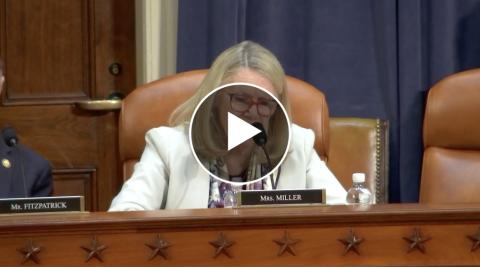Miller Participates in Ways and Means Health Subcommittee Hearing on Securing Quality Care for Patients
Washington, D.C. – Today, Congresswoman Carol Miller (R-WV) participated in a Ways and Means Health Subcommittee hearing titled “After the Hospital: Ensuring Access to Quality Post-Acute Care” for an overview of Congress’ current efforts to secure quality care for patients outside of the hospital.

Congresswoman Miller began by pointing out the medical challenges patients in rural communities’ face and how her bill, the Hospice Recertification Flexibility Act, would be a solution.
“Rural patients, like my constituents in West Virginia, are disproportionately left without the critical support they need to recover after major illnesses and from surgeries. This lack of access to essential care not only affects their recovery, but also increases their risk of complications, leading to longer hospital stays and a diminished quality of life. One way to address this critical gap is to expand telehealth usage in post-acute care settings. I introduced the Hospice Recertification Flexibility Act, which passed out of this committee last year. My bill would allow hospice providers to use telehealth to conduct face-to-face visits required for hospice recertification,” said Congresswoman Miller.
Congresswoman Miller asked Paul Dongilli, the CEO of Madonna Rehabilitation Hospitals, to speak to how rural access challenges can affect patients and their families.
“Mr. Dongilli, not only do patients suffer from a lack of proximity to necessary care, but their families and spouses are also deeply affected. For caregivers and loved ones, the inability to regularly visit or assist in the recovery process can lead to emotional, financial, and logistical strain. With these challenges in mind, can you speak about the impact of lack of access to care in rural areas on your patients' spouses and families and the challenges they face visiting their loved ones?” asked Congresswoman Miller.
“It is a very real issue for family members. We recognize that treating patients in post-acute care is not just treating that patient, it’s treating the entire family. It’s making them comfortable and confident to take their family member back home once they finish their episode of care. I know we’ve tried to institute various ways to make it easier for those family members to access the care we provide. We provide some family housing. We have the ability for family members to stay in the patient's rooms. They have access to amenities that would support the relocation for brief periods of time to our vicinity. I think that the part of the bill that you also co-sponsored is making it helpful and useful for folks to come to an LTCH (Long-Term Care Hospital) and for that LTCH to receive payment for them admitting directly from that critical access hospital. So that would hopefully help the patients, and their families receive the care that they need,” responded Mr. Dongilli.
Congresswoman Miller brought attention to the reimbursement issues Long-term care hospitals face and how her bill, the Patient Access to Long Term Care Hospitals Act, would resolve this financial challenge. She also asked Mr. Dongilli to share his personal experience in dealing with this barrier.
“Long-term care hospitals (LTCHs) are critical for patients who require extended care. The cost to treat the complex medical needs LTCH patients require can be significant. The reimbursement system for LTCHs is structured to help manage these costs, but recent changes to the high-cost outlier threshold have introduced new financial challenges. By raising this threshold, the amount of reimbursement LTCHs can receive for treating particularly costly cases has decreased. This puts additional strain on providers and affects the level of care available to patients. I introduced the Patient Access to Long Term Care Hospitals Act, which will provide adequate reimbursement for LTCHs. My bill also caps the high-cost outlier amount to $50,000. With this in mind, Mr. Dongilli, what has been the impact of the increase in the high-cost outlier threshold for LTCHs on providers such as yourself and the patients you treat?” asked Congresswoman Miller.
“From a provider and patient perspective, before the significant increase in the high-cost outlier - when it was still only $27,000 - we were able to allow more patients to enter the facility who we knew would become high cost outliers because that fixed income amount was such that we could manage that and still make a relatively small margin within our long-term care hospital. The margin at that time was close to 4%. When that doubled and it went to $58,000 or $57,000 what we saw was that we had to provide more scrutiny, even though we continue to admit those patients who would go into high-cost outlier status, the financial impact of doubling it resulted in our overall LTCH margin following from that 4% to a -3%. So, when you're talking about a significant number of cases and for us at that time, our high-cost outlier threshold was about 30%. So now, we have to limit that in order to just maintain financial solvency which denies patients access to the care that they need at that point in time,” responded Mr. Dongilli.
###